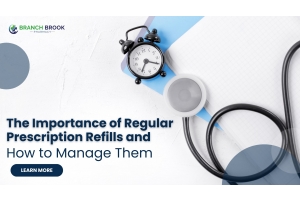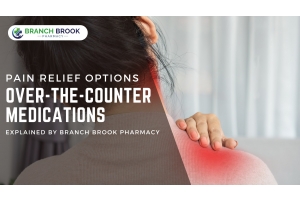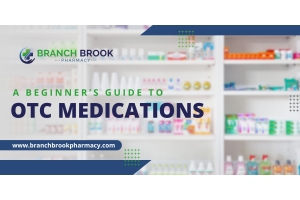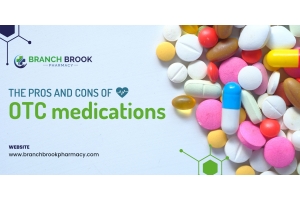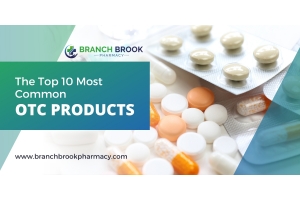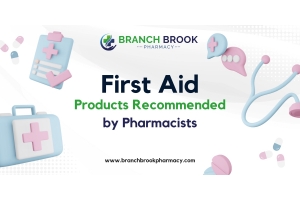The Importance of Medication Adherence: Tips for Staying on Track

In the realm of healthcare management, maintaining adherence to prescribed medication regimens is paramount for achieving positive health outcomes. Whether it's managing chronic conditions like diabetes or hypertension, or undergoing short-term treatments for infections, medication adherence plays a crucial role in ensuring the effectiveness of therapies. In this blog, we'll delve into the significance of medication adherence, offer practical tips for staying on track, and highlight why BranchBrooks Pharmacy stands out as your trusted partner in healthcare.
Understanding your medications: The importance of knowing what you're taking and why?
Taking medication is important to manage your health conditions and overcome illnesses. Many of us simply trust our healthcare providers and follow their instructions and take the medications as prescribed. Yet, it is essential to understand what you are taking and why.
Understanding your medication can help you avoid mistakes, for instance, taking the wrong pills or incorrect dosage. They can have serious consequences if not followed
properly. Knowing how your medicines work can help you understand the benefits
and potential side effects as well.
Key Statistics:
- According to the Centers for Disease Control and Prevention (CDC), approximately 50% of patients with chronic diseases in the United States do not take their medications as prescribed.
- Non-adherence to medication regimens contributes to nearly 30% of hospitalizations related to cardiovascular diseases.
- The World Health Organization estimates that only about 50% of patients worldwide adhere to long-term therapy.
Creating a medication schedule: Tips for organizing and tracking your medications.
Managing multiple medications can be a daunting task, especially when they need to be taken at different times throughout the day. However, by creating a medication schedule, you can streamline this process and ensure that you stay on track with your treatment plan. Here are some detailed tips for organizing and tracking your medications effectively:
1. Keep a Written Schedule
Keeping a written schedule is a simple yet effective way to organize your medications. You can create a schedule on paper or in a notebook, listing the name of each medication, its dosage, and the time it needs to be taken. Place the schedule in a visible location, such as your kitchen or bedside table, to serve as a constant reminder.
Tip:
- Include any special instructions or precautions for each medication, such as whether it should be taken with food or on an empty stomach.
2. Use a Medication Planner or App
In today's digital age, there are numerous medication planners and apps available to help you manage your medications more efficiently. These tools allow you to input your medications, dosages, and schedules, providing you with a clear overview of your treatment plan. Some apps even offer reminder features to alert you when it's time to take your next dose.
Tip:
- Choose a medication planner or app that suits your needs and preferences, whether you prefer a simple interface or more advanced features like medication interaction checks.
3. Make It a Routine
Incorporating your medication schedule into your daily routine can make it easier to remember to take your medications consistently. Try aligning your doses with specific activities or events, such as taking them with meals or before bedtime. By integrating your medications into your existing habits, you can establish a routine that becomes second nature over time.
Tip:
- Set specific times for taking your medications each day and stick to them as closely as possible to maintain consistency.
4. Set Reminders
Utilize the technology at your disposal by setting reminders on your phone or other electronic devices. Set alarms or notifications to prompt you to take your medications at the designated times each day. This can be especially helpful for individuals with busy schedules or those prone to forgetfulness.
Tip:
- Customize your reminders to include any additional information, such as which medications to take or any specific instructions.
Overcoming common barriers: Addressing issues like forgetfulness, side effects, and cost.
However, many people face some sort of barriers that makes it challenging to stick with the doctor’s instructions. Below is how to overcome those issues:
1. Forgetfulness
It might be somewhat impossible to avoid forgetting about our things. Yet, we can use a medication reminder app, set phone alarms, or put sticky notes in visible places to take the medicines on time. We should try making it a habit and check regularly whether that day’s task has been completed or not.
2. Fear of addiction
Some people may fear that they might get addicted or become dependent on medicines to manage their health condition. This is not always the case, however. Consulting your doctors or professionals can help you know if you need them for the long term or not.
3. Side effects
Talking to your healthcare provider about any side effects you are experiencing should be your priority. This helps them adjust your dosage or switch you to a different medication if needed. In any case, hiding your condition can make it worse than ever.
4. Lack of social support
Having no social support can make it difficult for people to follow their medicines. Family members or friends can help encourage you when you feel hard and aren’t able to continue.
5. Cost
Ask your healthcare provider or pharmacist about cost-saving options. For instance, you can check about generic medications that offer similar benefits and cost less than others.
Communicating with your healthcare team: The benefits of open and honest communication.
Effective communication is essential to achieve the best possible healthcare. When you have a good relationship with your healthcare team, you can work together to make better decisions about your health.
Communicating honestly means your diagnoses will be more accurate including effective treatment. By sharing information about your symptoms, the team can provide better care by focusing on the causes. Overall, working together and being open about your condition would help to achieve your health goals.
Why Choose BranchBrooks Pharmacy?
At BranchBrooks Pharmacy, we prioritize patient care and satisfaction, offering comprehensive pharmaceutical services tailored to meet your individual needs. Here's why we're your best choice for medication management:
Convenient Services:
- With our user-friendly website and mobile app, you can easily refill prescriptions, access medication information, and receive timely reminders to stay on track with your medications.
Quality Products and Expertise:
- We stock a wide range of high-quality medications and healthcare products, sourced from reputable manufacturers. Our team is committed to upholding the highest standards of pharmaceutical care and expertise.
Community Engagement:
- As a locally owned and operated pharmacy, we value our community relationships and actively engage in initiatives to promote health and wellness. When you choose BranchBrooks Pharmacy, you're supporting a business that cares about your well-being and the health of our community.
Experience the BranchBrooks Pharmacy Difference
Don't let medication adherence become a barrier to your health goals. Trust BranchBrooks Pharmacy to provide the support, resources, and expertise you need to stay on track with your medications and lead a healthier life. Visit our website at branchbrookpharmacy.com to learn more about our services and how we can assist you in your healthcare journey.
Your Health, Our Priority
At BranchBrooks Pharmacy, your health and well-being are our top priorities. Contact us today to experience the personalized care and convenience that set us apart as your trusted neighborhood pharmacy.
Conclusion
Adherence to medication works in the patients’ favor. It is a way to manage your illness and achieve your desired health goals. From setting reminders to organizing your medications, following the tips outlined here can help you achieve better health. Additionally, it allows you to take an active role in your treatment plan and make better decisions. You should ask your healthcare provider to explain the purpose of each drug, how it works, and how to take it properly.
Also Read: Quick Tips to Manage Common Digestive Disorders -Branch Brook Pharmacy



